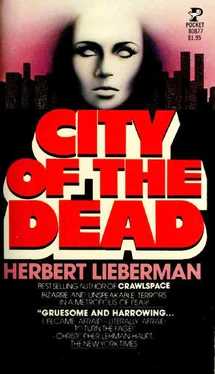“Lolly—Lolly, dear—don’t be frightened,” he says, terrified that she’ll hang up. “Say hello. Please say hello. I miss you so much.”
He waits, but he hears nothing—only the breathing.
“Lolly—I got your card this morning. It was funny.” He picks up the card and looks at the shaggy comic bear in doctor’s clothing. “I guess I do look a bit like that. Not quite so shaggy though—I shaved my beard. Idiotic to grow one in the first place at my age. Anyway—glad you remembered. You didn’t have to, but all the same, I’m happy you did. You all right?”
No answer, but there’s the breathing. It seems to have slackened and evened out a bit. He can almost hear her listening with her breath. That was enough for him. “Can’t you say anything? Maybe just hello—just so I can hear your voice. I’d love to hear your voice, dear. That would be the best birthday present.”
He waits. Still nothing.
“Lolly, if you won’t talk to me, won’t you at least write? Mail a letter from the Grand Central Post Office. It can’t be traced. All I want is to know you’re all right. That isn’t so unreasonable, is it? If you need money, I’ll send it to you. General Delivery. Care of a mail drop. Anything. Anything you want? Clothing? Food? Please, dear—just tell me you’re okay. That’s all I want. I won’t interfere with your life. I’ve done enough of that already. I know that now. I’ve had a lot of time to think, a lot of time to myself, and I know I was wrong. I’ve been wrong right along. I’m stubborn. A stupid, stubborn, pigheaded fool who believes he knows the right way for everybody. God, what an ass I am.”
Suddenly he’s laughing. “You know what I’ve been thinking?” He laughs again, but it’s a rather forced laugh. “These past few weeks I’ve been having this persistent memory of you when you were just a few weeks old.
I used to hold you on my knee and play with you and you would always cry and Mother tried to tell me that it was because my voice was too loud, and that it frightened you. But being the stubborn, stupid ass I am, I didn’t believe her, and I kept playing with you and you kept right on crying. Lolly—” Something catches in his, throat and he starts coughing violently. “I feel so rotten about you.” He coughs. “So goddamn sorry.” Coughs again. “Sorry—so sorry.” Coughing. Coughing. His voice trails off in a singsong lament.
“Your mother,” he runs on blindly now, having to speak, terrified she might hang up the moment he stops, “your mother, God rest her—your mother,” and suddenly for a moment he sees his child out there in some squalid flat with a naked light bulb, amid the sour gray linen of yesterday’s unmade beds. He can see her huddled before the phone somewhere out there in the jungle of the city—the slight, pretty, sensitive face with the large, startled eyes—her mother’s eyes—listening to his cough-choked voice. He imagines her in some grimy tenement district with its angry outcasts, its prowling predatory creatures. Cold, prideful, and frightened, how ill equipped she was to survive there—a fawn in leopard country.
“Lolly—Lolly,” he hurries on, “it’s five months now. Can’t we bury this thing? The house is so lonely with you and Mother gone. I’m thinking of selling it. Taking an apartment. It’s too much for me to keep up. Too big.
I prowl around it at night like a lunatic. Talking to the shadows. I can’t live there anymore. It’s full of ghosts. Can’t we see each other?”
He waits for some sign of relenting, but none comes. “Please, Lolly. I’m begging you. I’m not ashamed to beg—” The thing catches in his throat and again he starts to cough. The breathing on the other end suddenly stops. For a horrible moment he thinks she’s gone. Left him there dangling.
“Lolly—are you there? Lolly, don’t go.” He waits and the breathing resumes once more as if in answer to his question. “Lolly, I’ve had an idea. You know this month I’m making the final payment on the place out at the beach.” He talks rapidly now, speech spilling from him, a little out of breath, just trying to keep her there. “I’ve been thinking, dear—I’ve been thinking—you know, now that Mother’s gone—no reason why you shouldn’t have the house now. I mean, it was always meant for you anyway. That’s why Mother and I bought it in the first place. No reason why you have to wait for me to die to get it.” He laughs oafishly. “I know how you love the place and now you can live out there. Right bn the ocean, where you’ve always wanted to be. I’m having the whole place repainted next month. Putting in a stone patio overlooking the water. Everything’s paid off. You could have it just for the taxes. I mean, I’ll pay the taxes—but it’s your place. All yours. I’ll sign it over today if you’d like. Just give me the word and it’s yours. You can live there by yourself or with anyone you want. Even that friend of yours—” His voice lowers automatically, as if he fears being overheard. “I won’t interfere, Lolly. I promise. I’ll never interfere again. We’ve had some bad times, darling. But that’s all behind us. All I want now is for us to be friends again, and—”
He is about to go on, but in the next moment he hears a click, heartless and emphatic, then a rather high, distant ringing through the wires.
“Lolly—Lolly—Lolly—” He is shouting, as if he can bring her back by the sheer force and authority of his voice. But she’s gone, swallowed up once more out there in the great vortex of the city. Suddenly he’s angry, something amounting to rage erupting inside him. Or is it hate? He doesn’t know if it’s Lolly or himself who’s the object of it. He has degraded himself on the phone, pleaded like a feckless old man to someone who would not even deign to speak with him. Perhaps it wasn’t even she, but a perfect stranger. A wrong number or some creep who’d inadvertently blundered onto the line, gotten interested in his story and let him go on pouring his heart out. But, of course, he knows that isn’t so. He knows he’s spoken to his daughter, found her for a precious few moments only to lose her once again to that eerie, impenetrable anonymity in which she chose now to live.
He flings the phone back on the cradle, and not knowing exactly where he is going, he starts up. But in the next moment he falls back, slumping in his seat, his legs waxen and trembling. He has the feeling that if he could cry he would feel better. He sits there for a while and tries to cry, but he can’t. Nothing will come. He’s not the sort of man to cry. At least not outwardly. He wasn’t even able to cry when Ida died. Instead, he played poker—all night.
Suddenly he starts to shake. Very shortly he is shaking all over, and now he sits there in the noontime silence of a deserted office building, shaking, in a cold sweat, waiting patiently until whatever the emotion raging through him like a tide recedes.
Several moments later he has regained a modicum of composure—the demeanor of the pure professional with which he has faced the world for nearly four decades. But he feels spent and weary. Somewhere deep within him is the ache of longtime grief.
In the next moment he reaches down into the bottom right-hand drawer of the desk and withdraws from it a stethoscope. Unbuttoning his shirtfront, he screws the plugs firmly into his ears and listens. What he hears from the catacombs and tunnels just beneath his skin is the fatal ticking of his own life. For high up in the apex of his heart he can hear, quite distinctly, the steady, remorseless hissing of a badly damaged mitral valve, like the sound of air escaping from a slowly flattening tire.
A short time later he has barged across the hall to Haggard’-s office. The Chief Detective, Bureau of Identification, like everyone else at that hour, is out to lunch. Konig fumes with indignation. What right has Haggard to be out? What right has the Deputy Mayor to talk to him that way? What right has Lolly—He’s seething with his sense of betrayal and hurt.
Читать дальше












